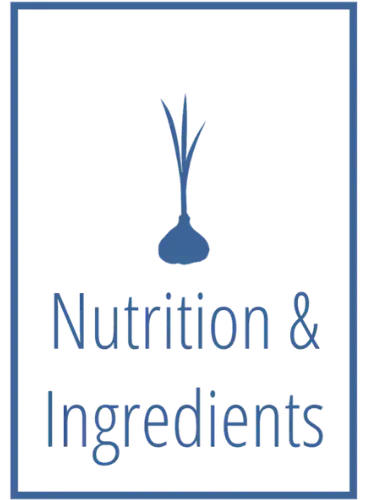Dunkin’ Jelly Donut
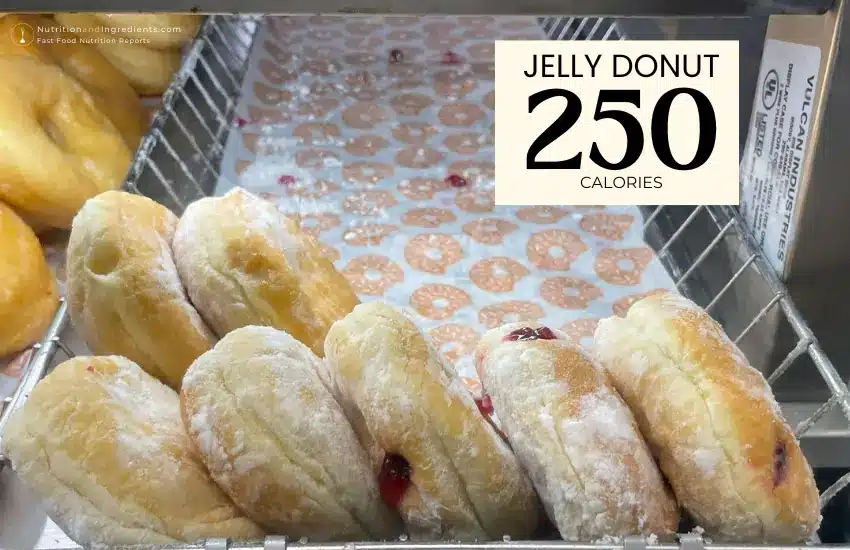
Dunkin’s Jelly Donut is a round yeast-based donut without a hole that is filled with a sweet jelly filling.
One Jelly Donut from Dunkin’ Donuts has 250 calories, 10 grams fat, 36 grams carbohydrates, and 4 grams protein.
This is your in-depth report of the calories, nutrition facts, and ingredients in a jelly donut from Dunkin’ Donuts.

Dunkin’ Jelly Donut Nutrition Information
Nutrition facts are based on standard formulations for one donut with jelly filling.
Calories
There are 250 calories in a single jelly donut from Dunkin’ Donuts fast food restaurant.
Here is a summary of the calories by macronutrient, per serving:
Carbohydrates contribute the highest proportion (about 58%) of total calories. Dietary fat makes up about 36% of total calories, and the remaining 6% is from protein.
Dunkin’ Jelly Donut
% calories from fat, carbs and proteinThe summary of calories by nutrient is a rounded estimate based on the nutrition facts provided by Dunkin’ Donuts. Calories may vary by location.
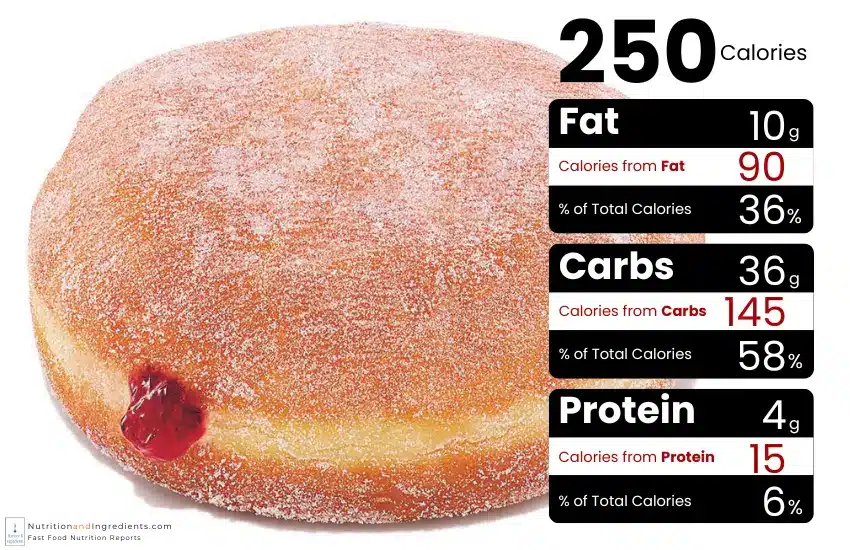
Time to Burn Calories
An average adult would need to run at a moderate pace for approximately 20 minutes to burn off the calories from a jelly donut.
Here is a list of the approximate times required to burn off the 250 calories, by type of exercise.
FITNESS TIME TO BURN 250 CALORIES
Estimate based on moderate level of activity by an adult with average BMI.
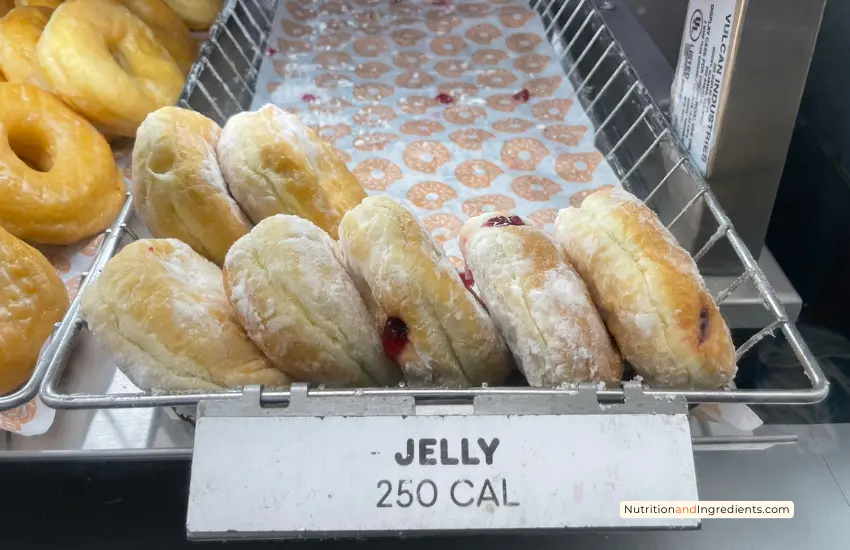
Nutrition Facts
Amount (%DV) per 1 Donut
Red indicates a high %DV.
|
Calories |
250 |
%DV |
|
Total Fat |
10g |
13% |
|
Saturated Fat |
4g |
20% |
|
Trans Fat |
0g | |
|
Cholesterol |
0mg |
0% |
|
Sodium |
290mg |
13% |
|
Carbohydrates |
36g |
13% |
|
Dietary Fiber |
1g |
4% |
|
Total Sugars |
13g | |
|
Added Sugars |
13g |
26% |
|
Protein |
4g |
%DV based on a 2,000 calorie diet. Calorie needs vary and your %DV may be higher or lower. Provided for informational purposes only. Consult with your physician for dietary or healthcare advice.
Daily Value
Daily Value (%DV) measures the amount of a nutrient per serving, relative to the recommended limit. Use %DV to compare and select foods for a balanced diet.
As shown in the chart below, Dunkin’s Jelly Donut is high in saturated fat and added sugars.
|
%DV |
Level | |
|
Saturated Fat |
20% |
HIGH |
|
Sodium |
13% |
MED |
|
Added Sugars |
26% |
HIGH |
%DV based on 2,000 calorie diet. FDA suggests a %DV of 5% or less is low and 20% or more is high.
Total Fat
One jelly donut from Dunkin’ has 10 grams of total fat, including 4 grams saturated fat. That is high.
The amount of saturated fat per donut has a 20% daily value.
To calculate %DV, divide the amount of a nutrient in one serving by the FDA-recommended daily limit.
|
per Donut |
Daily Limit* |
Daily Value | |
|
Total Fat |
10g |
78g |
13% |
|
Saturated Fat |
4g |
20g |
20% |
*Based on FDA general nutrition advice for an adult following 2,000 calorie daily diet.
Dietary Guidelines for Americans, published by the Department of Health and Human Services, recommend limiting calories from saturated fat to no more than 10% of total calories.
Summary of Fat in a Jelly Donut
Note: Saturated fats are usually solid at room temperature. According to the FDA, the human body naturally makes saturated fat and does not need to get the nutrient from foods.
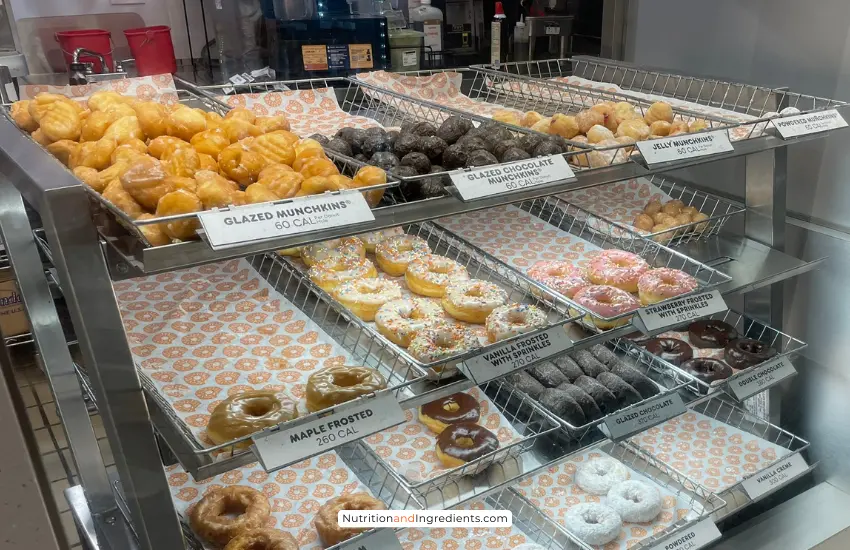
Sugars
The 36 grams of carbohydrates per Dunkin’ jelly donut contribute the greatest proportion of total calories. Carbs include one gram of dietary fiber and 13 grams added sugars.
Added sweeteners in the donut recipe include: dextrose, corn syrup, sugar, powdered sugar, and apple juice concentrate.
According to the FDA, “added sugars are a nutrient to get less of.” Dunkin’s jelly filled donut has 55 calories from added sugars, 21% of the total 250 calories.
Note: While sugars are found naturally in various fruits, vegetables, and dairy products, added sugars refer to the sugars that are added during the production of commercially processed foods. Added sugars include sucrose, dextrose, syrups, and honey.
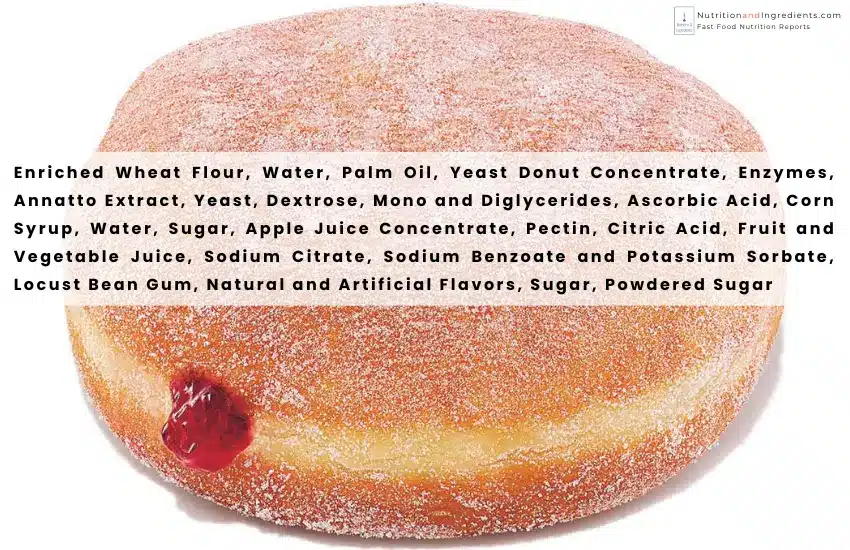
Jelly Donut Ingredients and Allergens
Here is the list of ingredients in the Donut, Jelly Filling, and Sugar Topping.
Ingredients
|
Donut |
|
Enriched Wheat Flour, Water, Palm Oil, Yeast Donut Concentrate, Enzymes, Annatto Extract (color), Yeast, Dextrose, Mono and Diglycerides, Ascorbic Acid |
|
Jelly Filling |
|
Corn Syrup, Water, Sugar, Apple Juice Concentrate, Pectin, Citric Acid, Fruit and Vegetable Juice (colors), Sodium Citrate, Sodium Benzoate and Potassium Sorbate (preservatives), Locust Bean Gum, Natural and Artificial Flavors |
|
Sugary Topping |
|
Sugar, Powdered Sugar (dextrose, corn starch, palm oil, soybean oil, artificial flavor) |
Allergens
Dunkin’ Donut’s jelly donut is made with egg, milk, soy, and wheat.
Check the list of allergens in Dunkin’ menu items.
Nutrition facts, prices, and ingredients are based on available information as of the date of publication. Restaurants and food manufacturers may change recipes or formulations without notice. Check package labels and ask the product manufacturer or restaurant for the most up-to-date information. Unless otherwise stated, %DV is based on a 2,000 calorie diet. All reports and reviews published on this site are for informational purposes only. NutritionandIngredients.com does not provide healthcare advice or dietary recommendations. Always consult your licensed physician for any healthcare or dietary advice.
Nutrition facts and ingredients source: Dunkin’. Image credits to Nutrition & Ingredients staff.
